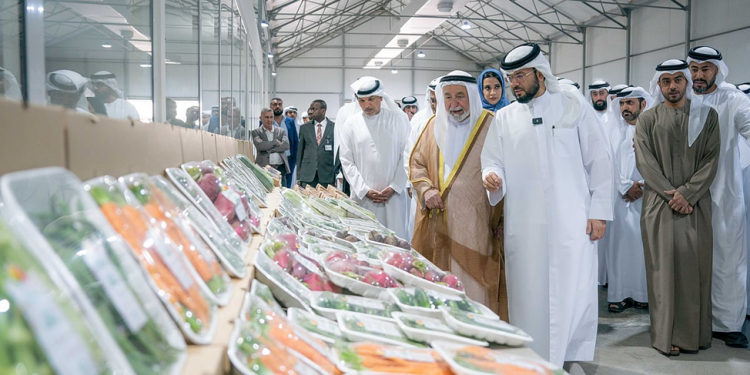In a landmark move for food sustainability in the UAE, Sharjah has launched a new product line of locally grown organic fruits and vegetables under the “Gheras” brand, managed by the Sharjah Agricultural and Livestock Production Establishment (EKTIFA). The initiative was officially inaugurated by Dr Sheikh Sultan bin Mohammed Al Qasimi, Supreme Council Member and Ruler of Sharjah, who also toured the greenhouse facilities in Al Dhaid.
The project currently operates across four climate-controlled greenhouses, optimized for year-round production. These facilities are designed to produce approximately 250 tonnes of organic fruits and vegetables per year, ensuring that crops are completely free from genetic modification (GMO) and synthetic inputs—making them compliant with global organic certification standards.
A Strategic Shift Toward Local, Organic, and Sustainable
This launch comes at a critical time when the UAE is ramping up efforts to enhance domestic food production and reduce reliance on imports. According to the UAE Ministry of Climate Change and Environment, the nation imports more than 80% of its food, making initiatives like Gheras vital for national food security.
The new greenhouses in Al Dhaid are equipped with precision agriculture technologies, enabling optimal control over humidity, temperature, irrigation, and pest management. These methods significantly improve resource efficiency, yielding higher productivity per square meter than conventional farming, while also reducing water consumption—a key concern in arid regions like the UAE.
Data from the International Center for Biosaline Agriculture (ICBA) shows that advanced greenhouse farming in the UAE can reduce water use by up to 90% compared to traditional field farming, especially when combined with hydroponics and sensor-based fertigation systems.
Expanding Market Potential for Local Organic Produce
With growing consumer demand for clean, traceable, and health-conscious food options, the introduction of this organic line addresses a rising market segment. According to Statista, the organic food market in the Middle East is expected to reach USD 2.5 billion by 2026, driven by urban consumer preferences for chemical-free and ethically grown produce.
By branding these goods under a localized identity (“Gheras”) and ensuring traceability, Sharjah positions itself to capture high-end retail and hospitality sectors both domestically and potentially across the GCC.
Moreover, organic agriculture initiatives like this can support the UAE’s “National Strategy for Food Security 2051”, which aims to rank the country among the top 10 most food-secure nations in the world through innovation, sustainable practices, and local production.
The launch of Sharjah’s organic product line under the Gheras initiative is a significant step toward sustainable food production in the UAE. With 250 tonnes of annual output from state-of-the-art greenhouses, the region is not only reducing its dependence on imports but also setting a benchmark for quality, traceability, and eco-friendly agriculture in the Gulf. For agronomists, farmers, and policy-makers, the Al Dhaid model offers valuable insights into building resilient food systems in arid environments.































